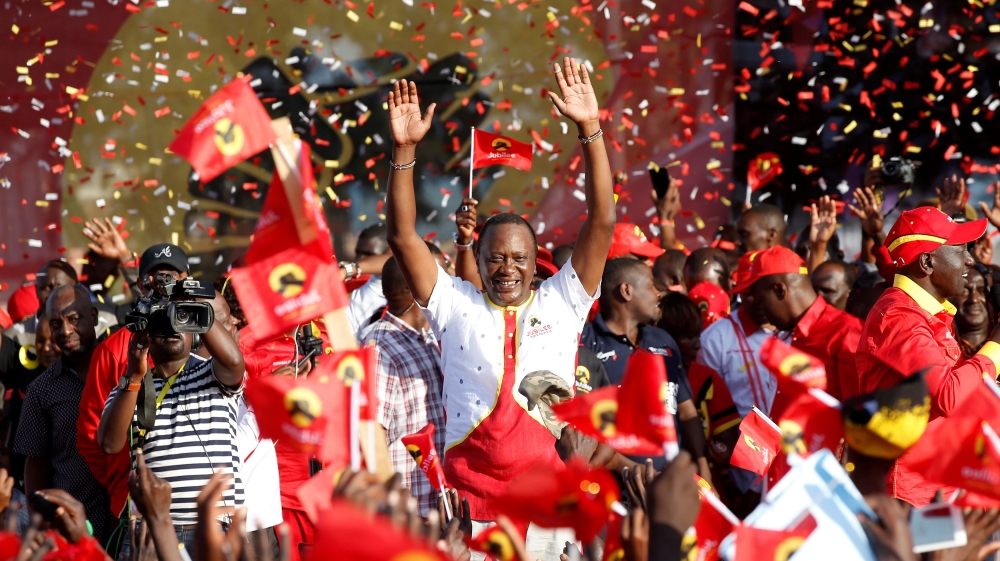Kenyan elections: The ethnicity factor

Nairobi, Kenya – A convoy of pick-up trucks wrapped in shiny touched-up photos of candidates and mounted with huge speakers drive slowly in front of Anne Wanjiru Kamau’s food stall in Nairobi’s Pangani area, blasting campaign speeches by politicians from Kenya’s opposition coalition. On August 8, Kamau and millions of Kenyan voters will cast their ballots in the country’s general election, but today, Kamau is not paying much attention to the campaign slogans passing by, nor are her customers.
“I will vote for Kenyatta. He is our son. They are wasting their time,” Kamau tells Al Jazeera as she weighs a kilo of red beans for a customer.
Kamau, like President Uhuru Kenyatta, comes from the Kikuyu tribe – the country’s biggest ethnic group.
Ethnicity plays a big role in who makes it to the presidency in this East African country. Kenya is home to more than 40 tribes and competition for political seats has never been more serious, with most Kenyans getting behind candidates from their ethnic groups.
The five largest ethnic groups – the Kikuyu, Luhya, Kalenjin, Luo and Kamba – make up nearly 70 percent of the country’s 48 million population, according to country’s last population census in 2009. Most of the leaders playing an important role in deciding the outcome of the election come from these tribes.
Voting for one of their own
The opposition coalition is led by former Prime Minister Raila Odinga from the Luo tribe – Kenya’s fourth-largest group. His running mates are from the Luhya and Kamba group. Kenyatta’s running mate is from the country’s third-biggest tribe.
“This is going to be my third time voting and I have never voted for someone from another tribe,” Kamau says.
“In 2007, I voted for Kibaki [a Kikuyu] and in 2013, I supported Kenyatta,” the 38-year-old added.
Almost all the voters who spoke to Al Jazeera in the Kenyan capital said they are voting for candidates from their own tribe out of “fear” of someone other than their own taking office and lack of “trust” in candidates from other ethnic groups.
Dorothy Makungu’s shop is located not far from Kamau’s stall across the traffic-congested road. She sells fruits and fresh juices to passing traffic and pedestrians. Makungu says she is not excited about the elections but knows for which candidate she will vote.
“There is nothing Kenyatta can say to make me vote for him. Last election, I voted for Raila and this time I will vote for him,” she says.
Makungu is from Kenya’s second biggest tribe, the Luhya. Moses Wetangula and Musalia Mudavadi, the leaders of the tribe, are in a coalition with Odinga.
“I support Wetangula as our leader and he is with Odinga,” 32-year-old Makungu says.
Ten minutes’ drive from Makungu’s shop towards downtown Nairobi, a group of young Boda Boda, motorcycle taxis, gather to wait for passengers as the city’s commuters leave work.
Most of the young men are wearing colourful jackets donned with images of the different parties and candidates running for office.
David Mawira Njeru, 29, is a third-time voter and it is clear from the stickers on his motorbike where his loyalty lies.
“I’m Uhuru. He is the only one I trust. To me, he is the only candidate I feel safe with,” says Njeru. “It is not tribalism. It is just preferring your own people.”
Titus Otieno from the Luo tribe, a university student and a supporter of Raila Odinga stands a short distance away in apparent hurry to join an opposition event. “We must back our own. Only our own will bring us development. And that’s why I’m going to vote Raila,” Otieno says rushing away.
Read more about who people will vote for in the Kenya elections
Winning 50 percent of votes
Politics in Kenya is fluid and ethnicity plays a huge part. To win the presidency, a candidate must win more than 50 percent and no single tribe has that number on its own. Candidates form tribal alliances to get themselves and their ethnic group a seat at the top table. Although, tribal coalitions are also easily broken up if a better offer comes along.
Mwai Kibaki, Raila Odinga, William Ruto were in a coalition against Uhuru Kenyatta in the 2002 election, which Kibaki won.
Then, the following election in 2007, Odinga and Ruto formed a coalition to oppose Kibaki and Kenyatta who were on the same side the next time around.
Kibaki was announced the winner, but the results were disputed by the opposition leading to deadly violence. More than 1,000 people were killed and over a half-million displaced. The violence only stopped after Kibaki and Odinga formed a coalition government. Kibaki left office in 2012 after he served two terms in office.
In the 2012 general election, Kenyatta formed a coalition with Ruto and contested against Odinga.
Joshua Ndongo Onono was a running mate of a presidential candidate in the 2012 election. Onono says politics in Kenya is not much different from politics in other parts of the world.
“In the West, many people vote certain way depending on whether they are working class or well-off. Some have conservative views and will vote for candidates on the right of the political spectrum. In Kenya, it is ethnicity,” Onono tells Al Jazeera.
“In 10 to 30 years, we will move on from this. We will base our decisions on what the candidates offer, for example, tax breaks or better and cheaper healthcare,” Onono adds.
But as campaigning comes to and end and candidates eagerly wait to see if their campaign rhetoric has convinced voters, Kenyans say they don’t expect their life to change no matter who wins.
“They are all the same. They are there for their own interest. The only difference between them is the tribe they belong to,” Kamau, the food stall owner, says.
The post Kenyan elections: The ethnicity factor appeared first on African Media Agency.
Source: AMA















